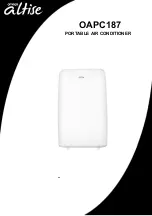
5.
Clamp fla
re form on the end of the pipe.
The end of the pipe must extend beyond
the fla
re form.
Flare form
Pipe
Fig. 7.5
6.
Place flaring tool onto the form.
7.
Tur
n the handle of the flaring tool clockwise
until the pipe is fully fla
red. Flare the pipe in
accordance with the dimensions shown in
table 7.5.
Table 7.5: PIPING EXTENSION BEYOND FLARE FORM
8.
Remove the flaring tool and fla
re form, then
inspect the end of the pipe for cracks and
even flaring.
Step 4:
Connect pipes
Connect the copper pipes to the indoor unit first,
then connect it to the outdoor unit. You should
first connect
the low-pressure pipe, then the high-
pressure pipe.
1.
When connecting the fla
re nuts, apply a thin coat
of r
efrigeration oil to the fla
red ends of the pipes.
2.
Align the center of the two pipes that you
will connect.
Indoor unit tubing
Flare nut
Pipe
Fig. 7.7
3.
T
ighten the fla
re nut as tightly as possible by hand.
4.
Using a spanner, grip the nut on the unit tubing.
5.
While firmly gripping the nut, use a to
rque
wr
ench to tighten the fla
re nut according to
the torque values in table 7.5.
NOTE: Use both a spanner and a torque wrench
when connecting or disconnecting pipes to/from
the unit.
Fig. 7.8
CAUTION
•
Ensure to wrap insulation around the piping.
Direct contact with the bare piping may result
in burns or frostbite.
•
Make sure the pipe is properly connected.
Over tightening may damage the bell mouth
and under tightening may lead to leakage.
NOTE ON MINIMUM BEND RADIUS
Carefully bend the tubing in the middle according
to the diagram below. DO NOT bend the tubing
more than 90° or more than 3 times.
Bend the pipe with thumb
min-radius 10cm (3.9”)
Fig. 7.9
6.
After connecting the copper pipes to the
indoor unit, wrap the power cable, signal
cable and the piping together with binding
tape.
NOTE:
DO NOT intertwine signal cable with
other wires. While bundling these items
together, do not intertwine or cross the signal
cable with any other wiring.
7.
Thread this pipeline through the wall and
connect it to the outdoor unit.
8.
Insulate all the piping, including the valves
of the outdoor unit.
9.
Open the stop valves of the outdoor unit
to start the flow of the
refrigerant
between the indoor and outdoor unit.
CAUTION
Check to make sure there is no refrigerant leak
after completing the installation work. If there is
a refrigerant leak, ventilate the area immediately
and evacuate the system (refer to the Air
Evacuation section of this manual).
Page 19
Refrigerant Piping
Connection
Pipe
gauge
Tightening
torque
Flare dimension (A)
(Unit: mm/Inch)
Flare shape
Min.
Max .
Ø 6.4
R0.4~0.8
45 °±2
90 °
± 4
A
Fig. 7.6
Ø 9.5
Ø 12.7
Ø 15.9
Ø 19.1
Ø 22
65-67 N.m
(663-683 kgf.cm)
23.2/0.91
23.7/0.93
75-85N.m
(765-867 kgf.cm)
26.4/1.04
26.9/1.06
18-20 N.m
(183-204 kgf.cm)
8.4/0.33
8.7/0.34
25-26 N.m
(255-265 kgf.cm)
13.2/0.52 13.5/0.53
35-36 N.m
(357-367 kgf.cm)
16.2/0.64 16.5/0.65
45-47 N.m
(459-480 kgf.cm)
19.2/0.76 19.7/0.78
Содержание IDUCOI12KC-3
Страница 29: ...Page 29 Test Run...
Страница 30: ...Test Run Page 30...












































